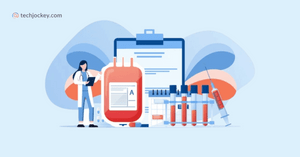What is Blood Bank Management Software?
Blood Bank Management Software (BBMS) is a specialized system designed to streamline the entire blood management process, ensuring efficiency, accuracy, and compliance. From donor registration and blood collection to storage, testing, and transfusion, this software automates every step, reducing human errors and enhancing safety.
By digitizing records and automating workflows, BBMS not only simplifies clerical tasks but also ensures the availability of blood units when needed, making it an indispensable tool for healthcare facilities and blood banks.
Who Needs Blood Bank Management Software?
Blood Bank Management Software is crucial for various organizations that manage blood donation, storage, and transfusion. Hospitals and clinics with active blood banks benefit significantly from BBMS as it helps maintain accurate inventory records and ensures seamless donor and recipient tracking. Standalone blood banks that handle large volumes of blood donations also require an efficient system to manage donors, test blood quality, and distribute units effectively.
Organizations that host blood donation camps find BBMS useful for organizing and tracking donations, ensuring smooth coordination between donors and medical staff. Research institutions and healthcare organizations focused on transfusion medicine also rely on BBMS to maintain accurate blood records and support their medical studies.
Why Invest in Blood Bank Management Software?
Managing a blood bank manually can be time-consuming and prone to errors, which is why BBMS is a necessity. The software improves operational efficiency by automating donor registration, blood testing, cross-matching, and inventory management. This automation reduces paperwork and administrative burdens, allowing healthcare staff to focus on critical medical tasks.
Safety and compliance are paramount in blood banking, and BBMS ensures that every unit undergoes rigorous quality checks before being issued. The system helps adhere to healthcare regulations by maintaining detailed records and providing real-time monitoring of blood inventory. With its real-time tracking capabilities, BBMS prevents shortages and excess stock, optimizing the use of available blood units.
Essential Modules of Blood Bank Management Software
A well-structured BBMS includes several core modules, each designed to handle a specific aspect of blood bank management.
- Donor Management: The Donor Management Module plays a crucial role in maintaining donor records, including personal details, medical history, and past donation records. It also helps track donor eligibility and ensures that only healthy donors participate in the process.
- The Blood Storage & Inventory Management: This Module ensures that blood units are stored correctly and monitored for expiration. This module tracks the availability of different blood groups and components, preventing shortages and ensuring that no expired blood is used.
- Recipient Management: This Module records all necessary details about blood recipients, including transfusion history, blood group compatibility, and any adverse reactions. This ensures that all transfusions are safe and well-documented.
- Equipment Management: This Module helps maintain the necessary medical equipment used in the blood collection, testing, and storage process. The software sends alerts when equipment needs maintenance or replacement, ensuring a smooth workflow.
- Blood Camp Management: For blood banks that organize donation camps, this module facilitates event planning and execution. It allows staff to schedule donation drives, allocate resources, and track donor participation effectively.
- Blood Issue & Billing Module: It ensures that blood is only issued after passing necessary tests and completing the billing process. This module also generates receipts and maintains a record of transactions.
- Report Generation: With this Module, blood banks can create detailed reports on blood availability, donor participation, and transfusion trends. These insights help improve operations and plan for future blood collection needs.
What Are The Features Of Blood Bank Management Software?
- Donor Screening
Laboratory testing of the donated blood is a must as you need to be sure that it is 100% safe for transfusion. Specific proteins will be checked, the blood will be tested for infectious diseases like hepatitis B, hepatitis C, HIV, etc. Blood bank management system software will facilitate in keeping an organized record of it to ensure there is no discrepancy at the time of cross blood matching.
- Cross Blood Matching
Blood bank management software helps in determining the compatibility between donor and recipient blood. It considers the blood group, tissues, and other blood components. Also, the presence of proteins or antibodies is tested to ensure compatibility. Data related to all these elements is inserted in the system, and automatic calculations are done to provide you with results.
- Report Generation
You can generate multiple reports on various bases, with the help of blood bank management system software. It can be generated based on the area from where blood has been donated and supplied. You can create a report to check which blood group is most sold. Also, a report can be made to analyze under which cases blood is most supplied such as accident, cancer, etc.
- Instant Search
With the help of a blood bank management information system, you need not maintain and search files physically. Unlike traditional methods, you will be able to find a file with a few clicks. Simply put blood component ID, donor name, donor registration number, and blood bag number, in the search box and you will have the complete list of details in no time.
- Blood Reservation
Blood bank management software allows you to store blood, only for a certain period. If it is not used in the prescribed period, blood is discarded. It is reserved with complete information such as the donor’s name, ID, blood type, number of blood bags donated, etc.
- Patient Management
Blood bank management system software facilitates patient management by capturing complete details of the patient and the hospital that requires blood. This module lets you take full charge of a patient. For instance, you will have complete information such as name, address, the purpose for which blood is used, transfusion reaction, etc.
Benefits of Implementing Blood Bank Management Software
Here are the benefits of Blood Bank Management Software (BBMS) explained in detail:
1. Automation of Operations
BBMS automates key functions such as donor registration, blood collection, testing, storage, transfusion, and inventory management. It eliminates manual paperwork, ensuring efficient and error-free operations. The system also reduces the chances of human errors in cross-matching and blood tracking, which is critical for patient safety.
2. Paperless Data Management and Quick Retrieval
A digital database ensures that all records related to donors, recipients, blood units, and transactions are stored in a centralized system. Users can retrieve information instantly using search filters such as donor ID, blood group, blood bag number, or transfusion date. This prevents delays and improves decision-making, particularly in emergencies.
3. Efficient Inventory Control
BBMS optimizes stock levels and prevents wastage through real-time monitoring of blood inventory. It follows industry-recommended practices like First In, First Out (FIFO) to ensure that older blood units are used before newer ones. Automated alerts notify staff about low stock levels or upcoming blood expiry dates, ensuring timely replenishment.
4. Enhanced Safety and Compliance
Blood transfusion safety is paramount, and BBMS ensures that all donated blood undergoes mandatory screening for infections and compatibility tests before transfusion. The system also enforces compliance with World Health Organization (WHO) and FDA guidelines, maintaining a transparent audit trail for inspections.
5. Deep Analytical Insights
Blood banks can generate detailed reports based on various parameters such as blood usage trends, donor demographics, most frequently required blood groups, and seasonal donation patterns. These insights help in forecasting demand, improving blood collection drives, and optimizing resource allocation.
6. Donor Engagement and Benefits
BBMS improves donor experience by allowing them to register online, schedule appointments, and track their donation history. Automated reminders and notifications encourage repeat donations, while donors can also receive health updates regarding their blood test results.
7. Seamless Recipient Management
Maintaining accurate transfusion records ensures that recipients receive the right blood type without delays. BBMS tracks each recipient’s transfusion history, medical conditions, and any adverse reactions. This improves patient safety and ensures blood transfusions are well-documented.
8. Enhanced Security and Data Protection
Since blood banks handle sensitive donor and recipient information, BBMS provides data security through role-based access control, encryption, and backup solutions. This prevents unauthorized access and ensures that medical data is securely stored.
9. Improved Workflow with Equipment Management
A well-functioning blood bank relies not only on blood availability but also on high-quality equipment. BBMS keeps track of blood testing machines, storage refrigerators, and other essential tools, alerting staff when maintenance is required. This minimizes downtime and ensures uninterrupted operations.
10. Streamlined Billing and Blood Issue Process
The software automates billing for blood transfusions, ensuring accurate and transparent pricing. Blood can only be issued after it has passed all necessary tests, eliminating any risks associated with unverified or contaminated blood units.
11. Scalability and Multi-location Support
Hospitals and large blood banks managing multiple locations can benefit from BBMS's cloud-based solutions, allowing seamless data sharing and synchronization across different facilities.
By implementing Blood Bank Management Software, organizations can achieve improved efficiency, enhanced safety, and better donor-recipient engagement, ultimately ensuring that life-saving blood is readily available when needed. Let me know if you need more details!
Cost of Blood Bank Management Software (BBMS) in India
The cost of Blood Bank Management Software (BBMS) varies based on factors such as features, scalability, deployment type (cloud/on-premise), and vendor reputation. Here’s a general breakdown:
| Type of BBMS | Estimated Cost Range | Remarks |
| Basic BBMS | ₹20,000 - ₹50,000 (one-time) | Suitable for small blood banks with essential donor & inventory management features. |
| Mid-range BBMS | ₹50,000 - ₹2,00,000 (one-time) | Includes automation, compliance tracking, and inventory control for medium-sized blood banks. |
| Enterprise-level BBMS | ₹2,00,000 - ₹5,00,000+ (one-time) | Advanced solutions for large hospitals & multi-location blood banks with high-end automation, reporting, and integrations. |
| Cloud-Based BBMS (SaaS Model) | ₹3,000 - ₹10,000/month | Subscription-based pricing, often preferred for its flexibility and lower upfront cost. |
| Government BBMS | Free | Centralized platforms available for government and public blood banks. |
Additional Costs to Consider:
- Customization & Integration: ₹10,000 - ₹1,00,000 (if required for specific workflows)
- Training & Support: ₹5,000 - ₹25,000 (depending on vendor support plans)
- Cloud Hosting Fees: ₹1,500 - ₹5,000/month (for cloud-based solutions)
- Annual Maintenance Cost (AMC): 10-20% of software cost
How to Choose the Right Blood Bank Management Software for Your Blood Bank?
Selecting the right Blood Bank Management Software (BBMS) is essential for ensuring efficiency, compliance, and safety in blood banking operations. Here’s how to choose the best solution:
- Define Your Operational Needs: Understand your blood bank’s requirements, including donor management, inventory tracking, and compliance needs. Consider whether a cloud-based or on-premises solution best fits your infrastructure.
- Automation & Integration Capabilities: Ensure the software automates key functions like donor registration, blood testing, and cross-matching. Seamless integration with Electronic Health Records (EHR) and Laboratory Information Systems (LIS) ensures smooth data flow across platforms.
- Regulatory Compliance: Choose software that complies with FDA, WHO, HIPAA, and NBTC regulations. Built-in audit trails and compliance reporting help meet industry standards and ensure safe blood transfusions.
- Security & Data Protection: BBMS must offer role-based access control, encryption, and automated backups to safeguard donor and recipient information from breaches or unauthorized access.
- Scalability for Future Growth: If your blood bank is expanding, opt for a scalable, cloud-based solution that supports multiple locations, real-time data updates, and growing donor databases.
- User-Friendliness & Training Support: A simple, intuitive interface reduces training time and minimizes errors. Look for vendors that provide training, user manuals, and dedicated support to help staff get acquainted with the software.
- Reliable Customer Support: Since blood banks operate round the clock, 24/7 customer support via phone, chat, and email is essential. Ensure quick response times for troubleshooting and technical assistance.
- Request a Demo & Free Trial: Test the software before purchasing. A free trial or live demo allows you to assess usability, integration, and features. Ensure it aligns with your workflow.
- Compare Cost: Look beyond initial costs. Compare subscription fees, customization charges, training costs, and long-term scalability expenses to choose the most cost-effective option.
- Vendor Reputation & Customer Reviews: Research vendor credibility by checking customer testimonials, case studies, and industry reviews. Choose a vendor with a proven track record in blood bank software solutions.
Investing in the right Blood Bank Management Software enhances operational efficiency, ensures regulatory compliance, and improves donor-recipient management. Carefully assess features, scalability, and support before making a decision.
Top 10 Blood Bank Software Price In India
| Blood Bank Software | Best For | Pricing |
| RAKT | Automated reporting & staff tracking | Rs. 96000 / Year |
| Ezovion | Hospital-integrated blood bank | On request |
| Aarogya | Mid-to-large hospitals | Starts at $5000 |
| Badar Blood Bank | Cost-effective donor management | ₹20,000 |
| eBloodBanking | Cloud-based inventory & donors | ₹35,400/year |
| Bagmo Blood Monitor | Transparent inventory tracking | On request |
| Birlamedisoft Net BB | Comprehensive blood bank ops | On request |
| Sara Technologies BBMS | Process automation & paperwork reduction | ₹150,000 |
| e-RaktKosh | Govt & private centralized system | Free |
| ACGIL BBMS | Online hospital integration | On request |
Investing in Blood Bank Management Software is a strategic decision that enhances efficiency, compliance, and safety in blood bank operations. By automating workflows and ensuring accurate record-keeping, BBMS improves donor engagement, optimizes inventory management, and ensures safe blood transfusions. Organizations must carefully evaluate their needs and choose a software solution that aligns with their operational goals, ensuring long-term benefits for both donors and recipients.

























